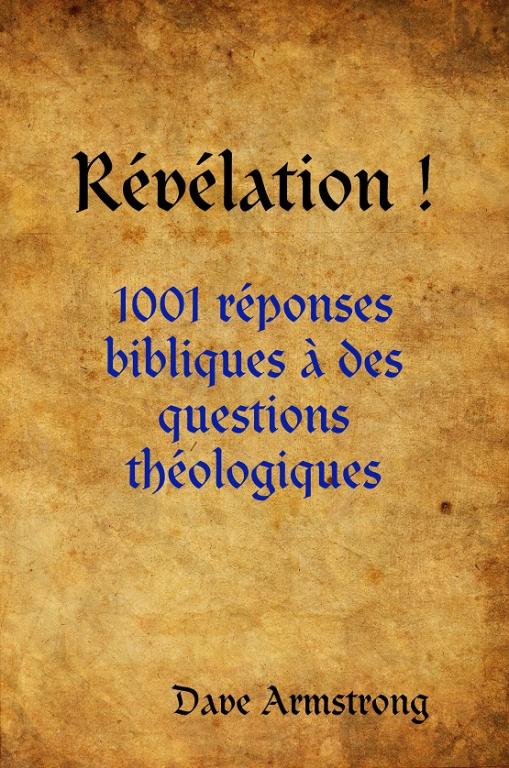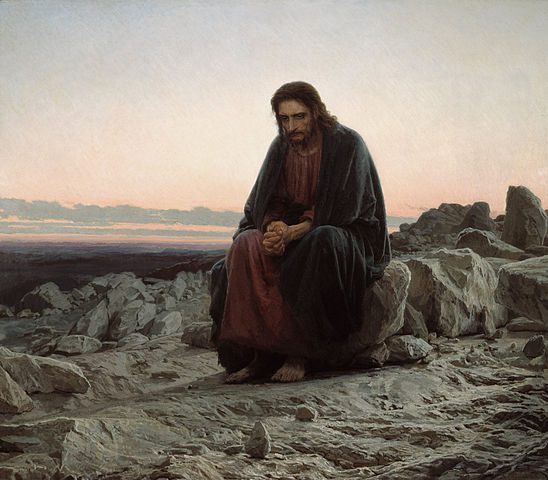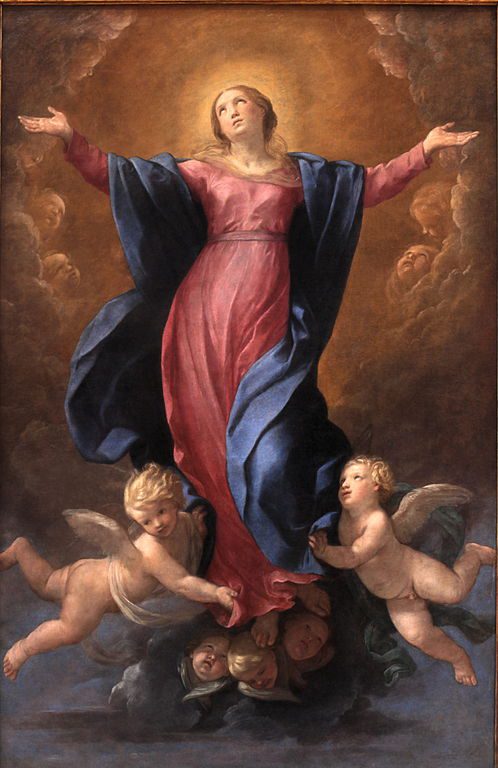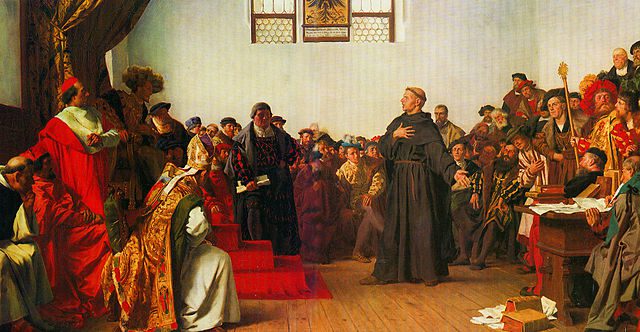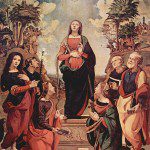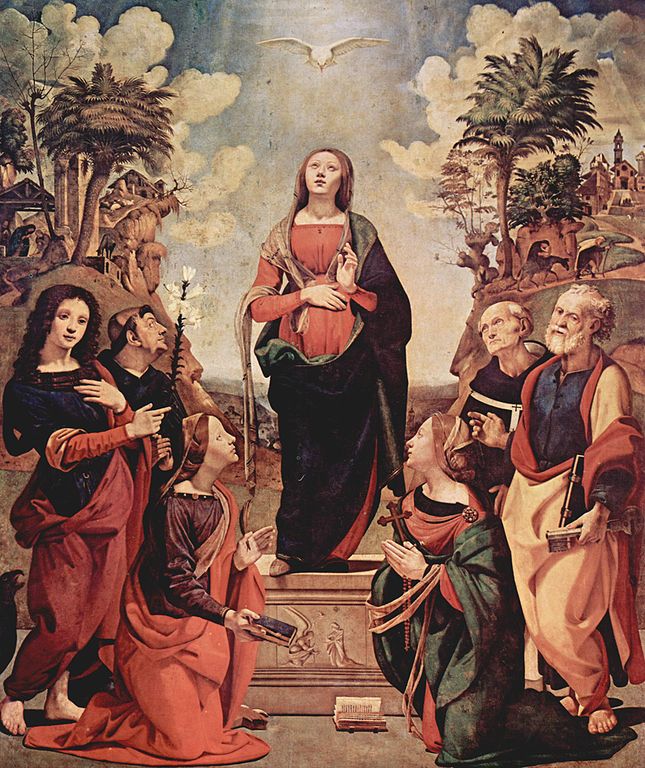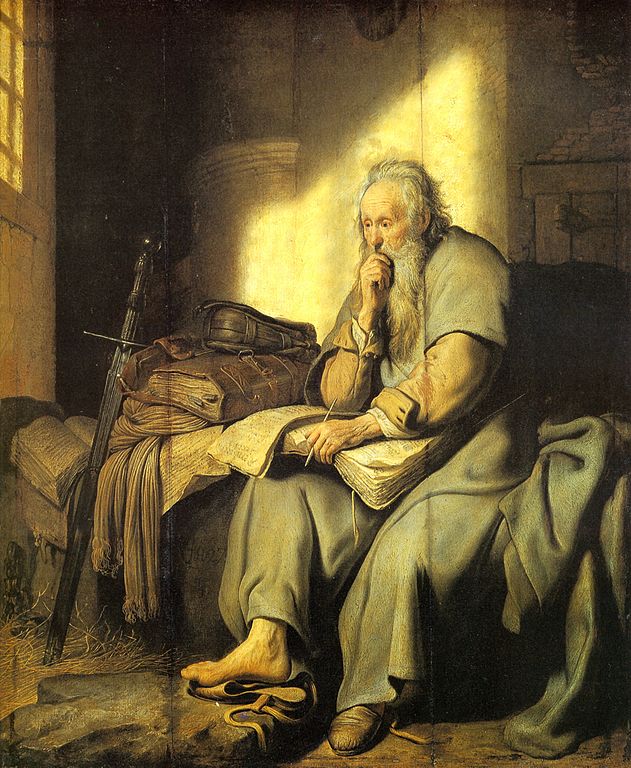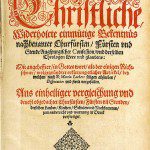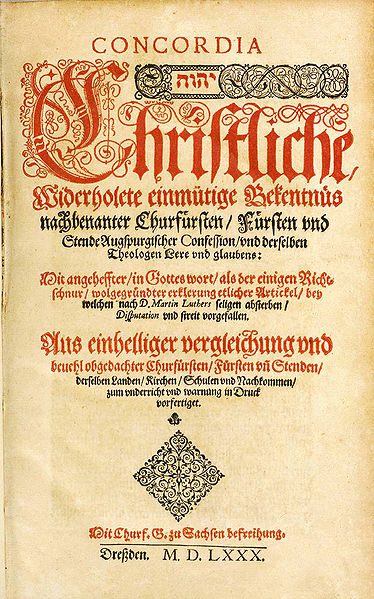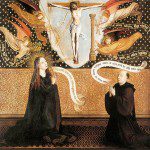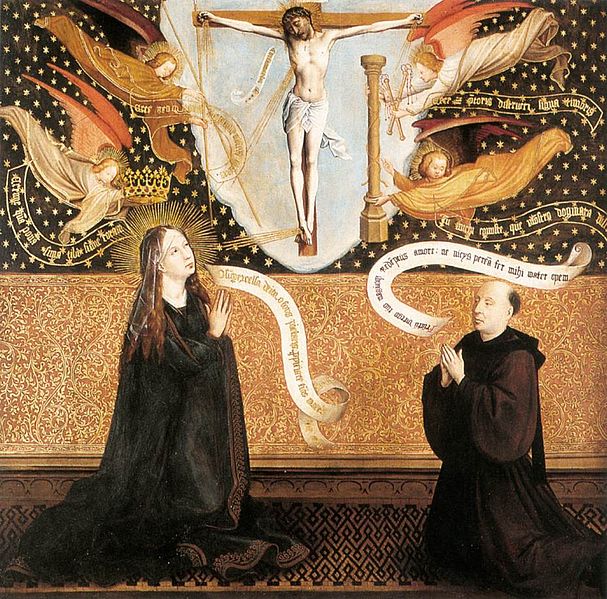[the context and background of all quotations can be consulted by following the links made in each instance to the primary sources — themselves all in the public domain]
* * * * *
1. Absolution . . .the peace of the Church looses sins, and estrangement from the Church retains them, not according to the will of men, but according to the will of God . . . (On Baptism, Against the Donatists, iii, 18, 23)
2. Angels, Intercession of . . . they [prayers] may be made known also to the angels that are in the presence of God, that these beings may in some way present them to God, and consult Him concerning them, and may bring to us, . . . according to that which they have there learned to be their duty; for the angel said to Tobias: “Now, therefore, when you prayed, and Sara your daughter-in-law, I brought the remembrance of your prayers before the Holy One.” [Tobit 12:12] (Letters, 130 [9, 18]: to Proba [412] )
3. Anointing, Sacrament of For unless that sign be applied, whether it be to the foreheads of believers, . . . or to the oil with which they receive the anointing chrism, . . . none of them is properly administered. . . . every good thing is sealed to us in the celebration of His sacraments . . . (Lectures on the Gospel of John, 118, 5)
4. Apostasy (Falling Away from the Faith or Salvation) Wherefore let us now consider that, which ought to be cast forth from the hearts of religious persons, that they lose not their own salvation through evil security, if they shall think faith sufficient in order to attain to it, and shall neglect to live well, and in good works to hold the way of God. (On Faith and Works, 21)
5. Apostolic Succession In this respect the testimony of the Catholic Church is conspicuous, as supported by a succession of bishops from the original seats of the apostles up to the present time, and by the consent of so many nations. (Against Faustus the Manichee xi, 2)
6. Baptism and Being “Born Again” . . . born again by baptism; the generation by which we shall rise again from the dead, and shall live with the Angels for ever. (Expositions on the Psalms, 135:13 [135, 11] )
7. Baptism and Justification . . . the question of baptism, . . . justified by the grace of God, . . . (Against the Letters of Petilian the Donatist, iii, 50, 62)
8. Baptism and Salvation . . . that sacrament, namely, of baptism, which brings salvation . . . (Letters, 98 [1]: to Boniface [408] )
9. Baptismal Regeneration . . . the sacrament of baptism is undoubtedly the sacrament of regeneration . . . (On Merit and the Forgiveness of Sins and on Infant Baptism ii, 43 [XXVII] )
10. Bishops . . . if in the office of bishop, or presbyter, or deacon, the orders of the Captain of our salvation be observed, there is no work in this life more difficult, toilsome, and hazardous, especially in our day, but none at the same time more blessed in the sight of God. (Letters, 21: to Bishop Valerius [391] )
11. Celibacy; Consecrated Virginity So, again, if your exhortations to virginity resembled the teaching of the apostle, “He who gives in marriage does well, and he who gives not in marriage does better;” [1 Corinthians 7:38] if you taught that marriage is good, and virginity better, as the Church teaches which is truly Christ’s Church, you would not have been described in the Spirit’s prediction as forbidding to marry. (Against Faustus the Manichee xxx, 6)
12. Church and Salvation . . . the Church our Mother, by whom we are born unto life eternal. (Sermons on the New Testament, 7, 2 [LVII] )
13. Church: Authority of . . . they admit the necessity of baptizing infants—finding themselves unable to contravene that authority of the universal Church, which has been unquestionably handed down by the Lord and His apostles . . . (On Merit and the Forgiveness of Sins and on Infant Baptism i, 39 [XXVI] )
14. Church: Blaspheming of What does it serve you, if you acknowledge the Lord, honour God, preach His name, acknowledge His Son, confess that He sits by His right hand; while you blaspheme His Church? (Expositions on the Psalms, 89:52 [89, 41] )
15. Church, Catholic . . . the name itself of Catholic, which, not without reason, amid so many heresies, the Church has thus retained; so that, though all heretics wish to be called Catholics, yet when a stranger asks where the Catholic Church meets, no heretic will venture to point to his own chapel or house. (Against the Fundamental Epistle of Manichaeus, 4, 5)
16. Church: Fullness of the Faith For when men come to the peace of the Catholic Church, then what was in them before they joined it, but did not profit them, begins at once to profit them. (On Baptism, Against the Donatists, vi, 9, 14)
17. Church, Holy Mother For have ye now merely heard that God is Almighty? But ye begin to have him for your father, when you have been born by the church as your Mother. (Sermon to Catechumens on the Creed, 1)
18. Church, Indefectibility of No one can erase from heaven the divine decree, no one can efface from earth the Church of God. (Letters, 43 [9, 27]: to Glorius, Eleusius, the Two Felixes, and Grammaticus [397] )
19. Church, Infallibility of For in the belly of the Church truth abides. Whosoever has been separated from this belly of the Church must needs speak false things: . . . (Expositions on the Psalms, 58:3 [58, 5] ) [syntax modified]
20. Church, One “True” . . . let them come to the true Church of Christ, that is, to the Catholic Church our mother . . . (Letters, 185 [9, 36 / 10, 46]: to Boniface [416])
21. Church, Sinners in My advice to you now is this: that you should at least desist from slandering the Catholic Church, by declaiming against the conduct of men whom the Church herself condemns, seeking daily to correct them as wicked children. . . . Those, again, who with wicked will persist in their old vices, . . . are indeed allowed to remain in the field of the Lord, and to grow along with the good seed; but the time for separating the tares will come. (On the Morals of the Catholic Church, 34, 76)
22. Church, Visible . . . you are not in the city upon a hill, which has this as its sure sign, that it cannot be hid. It is known therefore unto all nations. But the party of Donatus is unknown to the majority of nations, therefore is it not the true city. (Against the Letters of Petilian the Donatist, ii, 105, 239)
23. Confession Who is the proud? He who does not by confession of his sins do penance, that he may be healed through his humility. (Expositions on the Psalms, 94:12 [94, 11] )
24. Confirmation, Sacrament of . . . the laying on of hands now, that persons may receive the Holy Ghost . . . Then if you would know that you have received the Spirit, question your heart: lest haply you have the sacrament, and have not the virtue of the sacrament. (Homilies on the First Epistle of John, 6, 10)
25. Contraception; Contralife Will The doctrine that the production of children is an evil, directly opposes the next precept, “You shall not commit adultery;” for those who believe this doctrine, in order that their wives may not conceive, are led to commit adultery even in marriage. They take wives, as the law declares, for the procreation of children; but . . . their intercourse with their wives is not of a lawful character; and the production of children, which is the proper end of marriage, they seek to avoid. . . . you seek to destroy the purpose of marriage. Your doctrine turns marriage into an adulterous connection, and the bed-chamber into a brothel. (Against Faustus the Manichee, 15, 7)
26. Councils, Ecumenical They attempt, accordingly, to prevail against the firmly-settled authority of the immoveable Church . . . But He who is the most merciful Lord of faith has both secured the Church in the citadel of authority by most famous ecumenical Councils and the Apostolic sees themselves, and furnished her with the abundant armour of equally invincible reason . . . (Letters, 118 [5, 32]: to Deoscorus [410] )
27. Creation Days (Old Earth) . . . no one who reads the Scriptures, however negligently, need be told that in them “day” is customarily used for “time.” (City of God xx, 1)
28. Cross, Sign of the Let them all sign themselves with the sign of the cross of Christ . . . (Homilies on the First Epistle of John, 5, 7)
29. Dead, Almsgiving for Nor can it be denied that the souls of the dead are benefited by the piety of their living friends, who . . . give alms in the church on their behalf. (Enchiridion: Handbook on Faith, Hope, and Love, 110)
30. Dead, Masses for These things she [his mother Monica] entrusted not to us, but only desired to have her name remembered at Your altar, which she had served without the omission of a single day; whence she knew that the holy sacrifice was dispensed, . . . (The Confessions ix, 13, 36)
31. Dead, Offerings for . . . we take care, in regard to the offerings for the spirits of those who sleep, which indeed we are bound to believe to be of some use, . . . that which is a pious and honourable act of religious service shall be celebrated as it should be in the Church. (Letters, 22 [1, 6]: to Bishop Aurelius [392] )
32. Dead, Prayer for For if we cared not for the dead, we should not, as we do, supplicate God on their behalf. (On the Care of the Dead, 17)
33. Denominationalism; Sectarianism . . . there were to be schisms in various quarters of the world, which would be jealous of the Church Catholic spread abroad in the whole round world, and again those same schisms dividing themselves into the names of men, and by loving the men under whose authority they had been rent, opposing themselves to the glory of Christ which is throughout all lands . . . (Expositions on the Psalms, 72:9 [72, 12] )
34. Deuterocanon (So-Called “Apocrypha”) There are other books which seem to follow no regular order, and are connected neither with the order of the preceding books nor with one another, such as Job, and Tobias, and Esther, and Judith, and the two books of Maccabees, and the two of Ezra, which last look more like a sequel to the continuous regular history which terminates with the books of Kings and Chronicles. Next are the Prophets, in which there is one book of the Psalms of David; and three books of Solomon, viz., Proverbs, Song of Songs, and Ecclesiastes. For two books, one called Wisdom and the other Ecclesiasticus, are ascribed to Solomon from a certain resemblance of style, but the most likely opinion is that they were written by Jesus the son of Sirach. Still they are to be reckoned among the prophetical books, since they have attained recognition as being authoritative. . . . The authority of the Old Testament is contained within the limits of these forty-four books. (On Christian Doctrine, ii, 13; deuterocanonical books included are presently italicized; Augustine would have included Baruch as part of the book of Jeremiah)
35. Development of Doctrine For many things lay hid in the Scriptures: and when heretics had been cut off, with questions they troubled the Church of God: then those things were opened which lay hid, and the will of God was understood. . . . Therefore many men that could understand and expound the Scriptures very excellently, were hidden among the people of God: but they did not declare the solution of difficult questions, when no reviler again urged them. For was the Trinity perfectly treated of before the Arians snarled thereat? Was repentance perfectly treated of before the Novatians opposed? . . . (Expositions on the Psalms, [55, 21] )
36. Dissent (from Catholicism) / Anti-Catholicism “Let them be confounded and turned backward, as many as have evil will at Sion” [Psalm 129:5]. They who hate Sion, hate the Church: Sion is the Church. And they who hypocritically enter into the Church, hate the Church. They who refuse to keep the Word of God, hate the Church . . . (Expositions on the Psalms, 129:5 [129, 8] )
37. Divorce and Remarriage . . . the sanctity of the Sacrament, by reason of which it is unlawful for one who leaves her husband, even when she has been put away, to be married to another, so long as her husband lives, . . . (On the Good of Marriage, 32)
38. Ecumenism But there may be something Catholic outside the Catholic Church, just as the name of Christ could exist outside the congregation of Christ, in which name he who did not follow with the disciples was casting out devils. [Mark 9:38] . . . (On Baptism, Against the Donatists, vii, 39, 77)
39. Eucharist and Salvation If, however, Christ did not die in vain, then human nature cannot by any means be justified and redeemed from God’s most righteous wrath— in a word, from punishment— except by faith and the sacrament of the blood of Christ. (On Nature and Grace, 2 [II] )
40. Eucharist: Transubstantiation . . . Catholics . . . have eaten the body of Christ, not only sacramentally but really, being incorporated in His body, as the apostle says, “We, being many, are one bread, one body;” [1 Corinthians 10:17] (City of God xxi, 20)
41. Eucharistic Adoration . . . He walked here in very flesh, and gave that very flesh to us to eat for our salvation; and no one eats that flesh, unless he has first worshipped: we have found out in what sense such a footstool of our Lord’s may be worshipped, and not only that we sin not in worshipping it, but that we sin in not worshipping. (Expositions on the Psalms, 99:5 [99, 8] )
42. Evangelical Counsels When the judges, however, accepted Pelagius’ answer, they did not take it to convey the idea that those persons keep all the commandments of the law and the gospel who over and above maintain the state of virginity, which is not commanded—but only this, that virginity, which is not commanded, is something more than conjugal chastity, which is commanded; . . . the state of virginity, persevered in to the last, which is not commanded, is more than the chastity of married life, which is commanded. (On the Proceedings of Pelagius, 29 [XIII] )
43. Excommunication . . . what is bound on earth is bound in heaven, and what is loosed on earth is loosed in heaven,— for when the Church excommunicates, the excommunicated person is bound in heaven . . . (Lectures on the Gospel of John, 50, 12)
44. Faith Alone (Falsity of) Who is he that believes not that Jesus is the Christ? He that does not so live as Christ commanded. For many say, “I believe”: but faith without works saves not. Now the work of faith is Love, . . . (Homilies on the First Epistle of John, 10, 1)
45. Faith and Works Therefore, the apostle having said, “You are saved through faith,” [Ephesians 2:8] added, “And that not of yourselves, but it is the gift of God.” And again, lest they should say they deserved so great a gift by their works, he immediately added, “Not of works, lest any man should boast.” [Ephesians 2:9] Not that he denied good works, or emptied them of their value, when he says that “God renders to every man according to his works” [Romans 2:6]; but because works proceed from faith, and not faith from works. Therefore it is from Him that we have works of righteousness, from whom comes also faith itself . . . (On Grace and Free Will, 17)
46. Fast, Eucharistic Must we therefore censure the universal Church because the sacrament is everywhere partaken of by persons fasting? . . . for the honour of so great a sacrament, that the body of the Lord should take the precedence of all other food entering the mouth of a Christian . . . (Letters, 54 [6, 8]: to Januarius [400] )
47. Fasting and Abstinence And this is man’s righteousness in this life, fasting, alms, and prayer. Would you have your prayer fly upward to God? Make for it those two wings of alms and fasting. (Expositions on the Psalms, 43:5 [43, 7] )
48. Free Will . . . we may not so defend grace as to seem to take away free will, or, on the other hand, so assert free will as to be judged ungrateful to the grace of God, in our arrogant impiety. (On Merit and the Forgiveness of Sins and on Infant Baptism ii, 28 [XVIII] )
49. Free Will and God’s Foreknowledge . . . we are by no means compelled, either, retaining the prescience of God, to take away the freedom of the will, or, retaining the freedom of the will, to deny that He is prescient of future things, which is impious. But we embrace both. We faithfully and sincerely confess both. The former, that we may believe well; the latter, that we may live well. (City of God v, 10)
50. Friday Abstinence . . . the Lord suffered on the sixth day of the week, as is admitted by all: wherefore the sixth day also is rightly reckoned a day for fasting, as fasting is symbolic of humiliation; whence it is said, “I humbled my soul with fasting.” (Letters, 36 [13, 30]: to Casulanus [396] )
51. God: Circumincession / Coinherence / Perichoresis . . . we have already shown, by many modes of speech in the divine Scriptures, that, in this Trinity, what is said of each is also said of all, on account of the indivisible working of the one and same substance. (On the Trinity i, 12, 25)
52. God: Foreknowledge of . . . God most high, who is most rightly and most truly believed to know all things before they come to pass . . . (City of God v, 8)
53. God: Immutability (Unchangeable) And should any one suppose that anything in God’s substance or nature can suffer change or conversion, he will be held guilty of wild profanity. (On the Morals of the Catholic Church, 10)
54. God: Impeccability of (Impossibility of Sinning) Then again, inasmuch as, in an infinitely greater degree, it is God’s not to sin, shall we therefore venture to say that He is able both to sin and to avoid sin? God forbid that we should ever say that He is able to sin! (On Nature and Grace, 57 [XLIX] )
55. God: Middle Knowledge of For God knows His own future action, and therefore He knows also the effect of that action in preventing the happening of what would otherwise have happened . . . (Against Faustus the Manichee xxvi, 4)
56. God: Omniscience of The infinity of number, though there be no numbering of infinite numbers, is yet not incomprehensible by Him whose understanding is infinite. (City of God xii, 18)
57. God: Outside of Time But the place and time of these miracles are dependent on His unchangeable will, in which things future are ordered as if already they were accomplished. For He moves things temporal without Himself moving in time, He does not in one way know things that are to be, and, in another, things that have been; neither does He listen to those who pray otherwise than as He sees those that will pray. (City of God x, 12)
58. God, Providence of . . . all things in the universe, from the highest to the lowest, are governed by God’s providence. (Against Faustus the Manichee xxii, 19)
59. God: Self-Sufficiency of For He is perfect and independent, underived, not divided or scattered in space, but unchangeably self-existent, self-sufficient, and blessed in Himself. (Against Faustus the Manichee xiv, 11)
60. God: Simplicity of But the Catholic Church has taught me many other things also, . . . that God is not corporeal, that no part of Him can be perceived by corporeal eyes, that nothing of His Substance or Nature can any way suffer violence or change, or is compounded or formed . . . (On the Usefulness of Believing, 36)
61. God: Sustainer of Creation . . . sustaining, pervading, and protecting; creating, nourishing, and developing; seeking, and yet possessing all things. (The Confessions i, 4, 4)
62. God the Father: Monarchia / Principatus of The Holy Spirit thus receives of the Father, of whom the Son receives; for in this Trinity the Son is born of the Father, and from the Father the Holy Spirit proceeds. He, however, who is born of none, and proceeds from none, is the Father alone. (Lectures on the Gospel of John, 100, 4)
63. Gospels: Harmony of . . . any contradiction between the evangelists will fail to be detected, as nothing of that nature really exists. (Harmony of the Gospels iii, 2, 8)
64. Grace: Degrees or Greater Measure of . . . only let us love, only let us grow in grace . . . (Expositions on the Psalms [128, 8] )
65. Grace, Irresistible (Falsity of) If, however, being already regenerate and justified, he relapses of his own will into an evil life, assuredly he cannot say, “I have not received,” because of his own free choice to evil he has lost the grace of God, that he had received. (On Rebuke and Grace, 9 [VI] )
66. Hades; Sheol; Paradise; Intermediate State During the time, moreover, which intervenes between a man’s death and the final resurrection, the soul dwells in a hidden retreat, where it enjoys rest or suffers affliction just in proportion to the merit it has earned by the life which it led on earth. (Enchiridion: Handbook on Faith, Hope, and Love, 109)
67. Hardening of the Heart Nor should you take away from Pharaoh free will, because in several passages God says, “I have hardened Pharaoh;” or, “I have hardened” or “I will harden Pharaoh’s heart;” for it does not by any means follow that Pharaoh did not, on this account, harden his own heart. For this, too, is said of him, after the removal of the fly-plague from the Egyptians, in these words of the Scripture: “And Pharaoh hardened his heart at this time also; neither would he let the people go.” [Exodus 8:32] Thus it was that both God hardened him by His just judgment, and Pharaoh by his own free will. (On Grace and Free Will, 45 [XXIII] )
68. Hell (Eternal Punishment) It is in vain, then, that some, indeed very many, make moan over the eternal punishment, and perpetual, unintermitted torments of the lost, and say they do not believe it shall be so; . . . (Enchiridion: Handbook on Faith, Hope, and Love, 112)
69. Heresies . . . all the heresies have proceeded which deceive by the use of Christian terms. (On Baptism, Against the Donatists, v, 15, 20)
70. Holy Days Celebrate with temperance the birthdays of the Saints, that we may imitate those who have gone before us, . . . (Expositions on the Psalms, 89:52 [89, 41] )
71. Holy Items But, it will be said, we also have very many instruments and vessels made of materials or metal of this description for the purpose of celebrating the Sacraments, which being consecrated by these ministrations are called holy, in honour of Him who is thus worshipped for our salvation: . . . Do we pray unto them, because through them we pray to God? (Expositions on the Psalms, 115:7 [115, 7] )
72. Holy Places; Shrines But in regard to the answers to prayer which are visible to men, who can search out His reasons for appointing some places rather than others to be the scene of miraculous interpositions? To many the holiness of the place in which the body of the blessed Felix is buried is well known, and to this place I desired them to repair; because from it we may receive more easily and more reliably a written account of whatever may be discovered in either of them by divine interposition. (Letters, 78 [3]: to the Church at Hippo [404] )
73. Holy Spirit: Procession of (Filioque Dispute) And yet it is not to no purpose that in this Trinity the Son and none other is called the Word of God, and the Holy Spirit and none other the Gift of God, and God the Father alone is He from whom the Word is born, and from whom the Holy Spirit principally proceeds. And therefore I have added the word principally, because we find that the Holy Spirit proceeds from the Son also. But the Father gave Him this too, not as to one already existing, and not yet having it; but whatever He gave to the only-begotten Word, He gave by begetting Him. Therefore He so begot Him as that the common Gift should proceed from Him also, and the Holy Spirit should be the Spirit of both. (On the Trinity xv, 17, 29)
74. Homosexual Acts But as regards any part of the body which is not meant for generative purposes, should a man use even his own wife in it, it is against nature and flagitious. Indeed, the same apostle had previously [Romans 9:26] said concerning women: “Even their women did change the natural use into that which is against nature;” and then concerning men he added, that they worked that which is unseemly by leaving the natural use of the woman. Therefore, by the phrase in question, “the natural use,” it is not meant to praise conjugal connection; but thereby are denoted those flagitious deeds which are more unclean and criminal than even men’s use of women, which, even if unlawful, is nevertheless natural. (On Marriage and Concupiscence ii, 35 [XX] )
75. Images, Icons, and Statues: Use and Veneration of But in regard to pictures and statues, and other works of this kind, which are intended as representations of things, nobody makes a mistake, especially if they are executed by skilled artists, but every one, as soon as he sees the likenesses, recognizes the things they are likenesses of. (On Christian Doctrine, ii, 39)
76. Indulgences . . . when one is reconciled by the Church, the person so reconciled is loosed in heaven . . . (Lectures on the Gospel of John, 50, 12)
77. Jesus Christ: Supposed “Ignorance” of Certain Matters . . . they ought to have said to Him, whom they knew to be omniscient, “Thou needest not to ask any man,” . . . He, who knew all things, had no need even of that, and as little need had He of discovering by their questions what it was that any one desired to know of Him, for before a question was put, He knew the intention of him who was to put it. (Lectures on the Gospel of John, 103, 2)
78. Jonah and the Whale . . . either all the miracles wrought by divine power may be treated as incredible, or there is no reason why the story of this miracle should not be believed. The resurrection of Christ Himself upon the third day would not be believed by us, if the Christian faith was afraid to encounter Pagan ridicule. . . . I am much surprised that he reckoned what was done with Jonah to be incredible; unless, perchance, he thinks it easier for a dead man to be raised in life from his sepulchre, than for a living man to be kept in life in the spacious belly of a sea monster. . . . with how much greater force might they pronounce it incredible that the three young men cast into the furnace by the impious king walked unharmed in the midst of the flames! (Letters, 102 [30-32]: to Deogratias [409] )
79. Judgment and Works Next, in what manner is that true which He will say unto them whom He will set on his left hand, Go ye into everlnsting fire, which is prepared for the devil and his angels? Whom He rebukes, not because they have not believed in Him, but because they have not done good works. (On Faith and Works, 25)
80. Judgment of Nations Accordingly this seems to me to be one principal reason why the good are chastised along with the wicked, when God is pleased to visit with temporal punishments the profligate manners of a community. They are punished together, not because they have spent an equally corrupt life, but because the good as well as the wicked, though not equally with them, love this present life; . . . (City of God i, 9)
81. Justification, Infused As therefore, for example’s sake, a man who is lamed by a wound is cured in order that his step for the future may be direct and strong, its past infirmity being healed, so does the Heavenly Physician cure our maladies, not only that they may cease any longer to exist, but in order that we may ever afterwards be able to walk aright—to which we should be unequal, even after our healing, except by His continued help. . . . For, just as the eye of the body, even when completely sound, is unable to see unless aided by the brightness of light, so also man, even when most fully justified, is unable to lead a holy life, if he be not divinely assisted by the eternal light of righteousness. God, therefore, heals us not only that He may blot out the sin which we have committed, but, furthermore, that He may enable us even to avoid sinning. (On Nature and Grace, 29 [XXVI] )
82. Lent . . . Christians, not heretics, but Catholics, in order to subdue the body, that the soul may be more humbled in prayer, abstain not only from animal food, but also from some vegetable productions, without, however, believing them to be unclean. A few do this always; and at certain seasons or days, as in Lent, almost all, more or less, according to the choice or ability of individuals. (Against Faustus the Manichee xxx, 5)
83. Marriage: Sacrament . . . in the City of our God, in His Holy Hill, that is, in the Church, wherein of marriage, not the bond alone, but the Sacrament is so set forth, as that it is not lawful for a man to deliver his wife unto another . . . (On Faith and Works, 10)
84. Mary: Mother of God (Theotokos) Moreover, those parties also are to be abhorred who deny that our Lord Jesus Christ had in Mary a mother upon earth; . . . Neither is there anything to compel us to a denial of the mother of the Lord, in the circumstance that this word was spoken by Him: “Woman, what have I to do with you? Mine hour is not yet come.” But He rather admonishes us to understand that, in respect of His being God, there was no mother for Him, the part of whose personal majesty (cujus majestatis personam) He was preparing to show forth in the turning of water into wine. . . . if, on the ground of His having said, “Who is my mother?” every one should conclude that He had no mother on earth, then each should as matter of course be also compelled to deny that the apostles had fathers on earth; since He gave them an injunction in these terms: “Call no man your father upon the earth; for one is your Father, which is in heaven.” (Of Faith and the Creed, 4, 9)
85. Mary: New Eve; Second Eve . . . since through a female death had happened unto us, life unto us through a female should be born: that so of either nature, that is, the female and male, the devil being overcome might be put to torment, seeing that he was rejoicing in the overthrow of both; . . . (On the Christian Conflict, 24)
86. Mary: Perpetual Virginity of . . . being born of a mother who, although she conceived without being touched by man and always remained thus untouched . . . (On Catechizing the Uninstructed, 22, 40)
87. Mary: Sinlessness We must except the holy Virgin Mary, concerning whom I wish to raise no question when it touches the subject of sins, out of honour to the Lord; for from Him we know what abundance of grace for overcoming sin in every particular was conferred upon her who had the merit to conceive and bear Him who undoubtedly had no sin. [1 John 3:5] (On Nature and Grace, 42 [XXXVI] )
88. Mary: Virginity In Partu (During Childbirth) The body of the infant Jesus was brought forth from the womb of His mother, still a virgin, by the same power which afterwards introduced His body when He was a man through the closed door into the upper chamber. [John 20:26] (Letters, 137 [2, 8]: to Volusianus [412] )
89. Mass, Daily . . . some partake daily of the body and blood of Christ, others receive it on stated days: in some places no day passes without the sacrifice being offered; . . . (Letters, 54 [2, 2]: to Januarius [400] )
90. Mass, Sacrifice of And hence that true Mediator, in so far as, by assuming the form of a servant, He became the Mediator between God and men, the man Christ Jesus, though in the form of God He received sacrifice together with the Father, with whom He is one God, yet in the form of a servant He chose rather to be than to receive a sacrifice, . . . Thus He is both the Priest who offers and the Sacrifice offered. And He designed that there should be a daily sign of this in the sacrifice of the Church, which, being His body, learns to offer herself through Him. Of this true Sacrifice the ancient sacrifices of the saints were the various and numerous signs; . . . To this supreme and true sacrifice all false sacrifices have given place. (City of God x, 20)
91. Mass, Sacrifice of (and the Crucifixion) You know that in ordinary parlance we often say, when Easter is approaching, “Tomorrow or the day after is the Lord’s Passion,” although He suffered so many years ago, and His passion was endured once for all time. In like manner, on Easter Sunday, we say, “This day the Lord rose from the dead,” although so many years have passed since His resurrection. But no one is so foolish as to accuse us of falsehood when we use these phrases, for this reason, that we give such names to these days on the ground of a likeness between them and the days on which the events referred to actually transpired, the day being called the day of that event, although it is not the very day on which the event took place, but one corresponding to it by the revolution of the same time of the year, and the event itself being said to take place on that day, because, although it really took place long before, it is on that day sacramentally celebrated.Was not Christ once for all offered up in His own person as a sacrifice? And yet, is He not likewise offered up in the sacrament as a sacrifice, not only in the special solemnities of Easter, but also daily among our congregations . . .? (Letters, 98 [9]: to Boniface [408] )
92. Merit Merit is accumulating now to the believer, and then the reward is paid into the hand of the beholder. . . . As far as each one has been a partaker of You, some less, some more, such will be the diversity of rewards in proportion to the diversity of merits . . . (Lectures on the Gospel of John, 68, 3)
93. Monks and Nuns . . . servants of God, who wished to hold a more lofty degree of sanctity in the Church, in cutting off all ties of secular hope, and dedicating a mind at liberty to their godly service of warfare . . . (On the Work of Monks, 19)
94. Mortification and Self-Denial Emulate each other in prayer with a holy rivalry, with one heart, for you wrestle not against each other, but against the devil, who is the common enemy of all the saints. “By fasting, by vigils, and all mortification of the body, prayer is greatly helped.” [Tobit 12:8] (Letters, 130 [16, 31]: to Proba [412] )
95. Original Sin; Fall of Man It was not I who devised the original sin, which the catholic faith holds from ancient times; but you, who deny it, are undoubtedly an innovating heretic. In the judgment of God, all are in the devil’s power, born in sin, unless they are regenerated in Christ. (On Marriage and Concupiscence ii, 25 [XII] )
96. Orthodoxy (Correct Beliefs) But the right faith of the Catholic Church rejects such a fiction, and perceives it to be a devilish doctrine: . . . Let us therefore reject this kind of error, which the Holy Church has anathematized from the beginning. (Lectures on the Gospel of John, 34, 2)
97. Paganism and Christianity Moreover, if those who are called philosophers, and especially the Platonists, have said anything that is true and in harmony with our faith, we are not only not to shrink from it, but to claim it for our own use from those who have unlawful possession of it. . . . take and turn to a Christian use. (On Christian Doctrine, ii, 60)
98. Papacy; Popes For who does not see in what degree Cœlestius was bound by the interrogations of your holy predecessor and by the answers of Cœlestius, whereby he professed that he consented to the letters of Pope Innocent, and fastened by a most wholesome chain, so as not to dare any further to maintain that the original sin of infants is not put away in baptism? . . . What could be more clear or more manifest than that judgment of the Apostolical See? (Against Two Letters of the Pelagians ii, 6 [IV] )
99. Paul the Apostle: Commissioned by the Church Let us beware of such dangerous temptations of pride, and let us rather consider the fact that the Apostle Paul himself, although stricken down and admonished by the voice of God from heaven, was yet sent to a man to receive the sacraments and be admitted into the Church; [Acts 9:3] . . . (On Christian Doctrine, Preface, 6)
100. Penance On this account it is also, either for the demonstration of our debt of misery, or for the amendment of our passing life, or for the exercise of the necessary patience, that man is kept through time in the penalty, even when he is no longer held by his sin as liable to everlasting damnation. (Lectures on the Gospel of John, 124, 5)
101. Peter: Primacy of . . . the Apostle Peter, in whom the primacy of the apostles shines with such exceeding grace, . . . I suppose that there is no slight to Cyprian in comparing him with Peter in respect to his crown of martyrdom; rather I ought to be afraid lest I am showing disrespect towards Peter. For who can be ignorant that the primacy of his apostleship is to be preferred to any episcopate whatever? (On Baptism, Against the Donatists, ii, 1, 2)
102. Prayer (of the Righteous) For one single prayer of one who obeys is sooner heard than ten thousand of a despiser. (On the Work of Monks, 20)
103. Priests; Sacrament of Holy Orders In like manner as if there take place an ordination of clergy in order to form a congregation of people, although the congregation of people follow not, yet there remains in the ordained persons the Sacrament of Ordination; and if, for any fault, any be removed from his office, he will not be without the Sacrament of the Lord once for all set upon him, albeit continuing unto condemnation. (On the Good of Marriage, 32)
104. Priests and “Call No Man ‘Father’” . . . Paul the elder says, “Not to confound you I am writing these things, but as my dearly beloved sons I am admonishing you:” [1 Corinthians 4:14] though he knew of a truth that it had been said by the Lord, “Call ye no man your father on earth, for One is your Father, even God.” [Matthew 23:9] And this was not said in order that this term of human honour should be erased from our usual way of speaking: but lest the grace of God whereby we are regenerated unto eternal life, should be ascribed either to the power or even sanctity of any man. (Expositions on the Psalms, 78:12 [78, 10] )
105. Procreation . . . cohabitation for the purpose of procreating children, which must be admitted to be the proper end of marriage, . . . child-bearing, which is the end and aim of marriage. (On Marriage and Concupiscence i, 16 [XIV] )
106. Purgatory . . . will any man say this time of faith can be placed on an equal footing with that consummation when they who offer sacrifices in righteousness shall be purified by the fire of the last judgment? . . . after the judgment those who are worthy of such purification shall be purified even by fire, and shall be rendered thoroughly sinless, and shall offer themselves to God in righteousness, and be indeed victims immaculate and free from all blemish whatever . . . (City of God xx, 26)
107. Relics For even now miracles are wrought in the name of Christ, whether by His sacraments or by the prayers or relics of His saints . . . The miracle which was wrought at Milan when I was there, and by which a blind man was restored to sight, could come to the knowledge of many; . . . the occurrence was witnessed by an immense concourse of people that had gathered to the bodies of the martyrs Protasius and Gervasius, . . . By virtue of these remains the darkness of that blind man was scattered, and he saw the light of day. (City of God xxii, 8)
108. Reprobation; Causes of Damnation God no doubt wishes all men to be saved [1 Timothy 2:4] and to come into the knowledge of the truth; but yet not so as to take away from them free will, for the good or the evil use of which they may be most righteously judged. This being the case, unbelievers indeed do contrary to the will of God when they do not believe His gospel; nevertheless they do not therefore overcome His will, but rob their own selves of the great, nay, the very greatest, good, and implicate themselves in penalties of punishment, destined to experience the power of Him in punishments whose mercy in His gifts they despised. (On the Spirit and the Letter, 58)
109. Roman Primacy For already have two councils on this question been sent to the Apostolic see; and rescripts also have come from thence. The question has been brought to an issue; would that their error may sometime be brought to an issue too! (Sermons on the New Testament, 81, 10 [CXXXI] )
110. Rule of Faith / “Three-Legged Stool” (Bible-Church-Tradition) But those reasons which I have here given, I have either gathered from the authority of the church, according to the tradition of our forefathers, or from the testimony of the divine Scriptures, . . . No sober person will decide against reason, no Christian against the Scriptures, no peaceable person against the church. (On the Trinity iv, 6, 10)
111. Sacramentals and Sacramentalism Sanctification is not of merely one measure; for even catechumens, I take it, are sanctified in their own measure by the sign of Christ, and the prayer of imposition of hands; and what they receive is holy, although it is not the body of Christ—holier than any food which constitutes our ordinary nourishment, because it is a sacrament. (On Merit and the Forgiveness of Sins and on Infant Baptism ii, 42)
112. Sacraments . . . that they may be healed of the plague of their sin by the medicine of His sacraments . . . (On Merit and the Forgiveness of Sins and on Infant Baptism iii, 8)
113. Sacraments and Grace . . . grace, which is the virtue of the Sacraments, . . . (Expositions on the Psalms, 78:1 [78, 2] )
114. Sacraments and Salvation . . . the sacraments of the Church, without which there is no entrance to the life which is the true life. (Lectures on the Gospel of John, 120, 2)
115. Sacraments: Ex Opere Operato Remember, therefore, that the characters of bad men in no wise interfere with the virtue of the sacraments, so that their holiness should either be destroyed, or even diminished; but that they injure the unrighteous men themselves, that they should have them as witnesses of their damnation, not as aids to health. (Against the Letters of Petilian the Donatist, ii, 47, 110)
116. Saints: Awareness of and Contact with This World Hence too is solved that question, how is it that the Martyrs, by the very benefits which are given to them that pray, indicate that they take an interest in the affairs of men, if the dead know not what the quick are doing. . . . We are not to think then, that to be interested in the affairs of the living is in the power of any departed who please, only because to some men’s healing or help the Martyrs be present: but rather we are to understand that it must needs be by a Divine power that the Martyrs are interested in affairs of the living, from the very fact that for the departed to be by their proper nature interested in affairs of the living is impossible. (On the Care of the Dead, 19)
117. Saints, Communion of For the souls of the pious dead are not separated from the Church, which even now is the kingdom of Christ; otherwise there would be no remembrance made of them at the altar of God in the partaking of the body of Christ, . . . For why are these things practised, if not because the faithful, even though dead, are His members? (City of God xx, 9)
118. Saints, Incorruptible Bodies of . . . the bodies of Gervasius and Protasius, the martyrs (whom You had in Your secret storehouse preserved uncorrupted for so many years), . . . (The Confessions ix, 7, 16)
119. Saints, Intercession of It is true that Christians pay religious honor to the memory of the martyrs, both to excite us to imitate them and to obtain a share in their merits, and the assistance of their prayers. (Against Faustus the Manichee xx, 21)
120. Saints, Invocation of There was a fellow-townsman of ours at Hippo, Florentius, an old man, religious and poor, who supported himself as a tailor. Having lost his coat, and not having means to buy another, he prayed to the Twenty Martyrs, who have a very celebrated memorial shrine in our town, begging in a distinct voice that he might be clothed. . . . he, walking on in silence, saw on the shore a great fish, gasping as if just cast up, . . . on cutting up the fish, the cook found a gold ring in its belly; . . .(City of God xxii, 8)
121. Saints, Veneration of But we build altars not to any martyr, but to the God of martyrs, although it is to the memory of the martyrs. No one officiating at the altar in the saints’ burying-place ever says, We bring an offering to you, O Peter! Or O Paul! Or O Cyprian! The offering is made to God, who gave the crown of martyrdom, while it is in memory of those thus crowned. The emotion is increased by the associations of the place, and love is excited both towards those who are our examples, and towards Him by whose help we may follow such examples. We regard the martyrs with the same affectionate intimacy that we feel towards holy men of God in this life, when we know that their hearts are prepared to endure the same suffering for the truth of the gospel. There is more devotion in our feeling towards the martyrs, because we know that their conflict is over; and we can speak with greater confidence in praise of those already victors in heaven, than of those still combating here. (Against Faustus the Manichee xx, 21)
122. Sanctification But it may be inquired how they were no more of the world, if they were not yet sanctified in the truth; or, if they already were, why He requests that they should be so. Is it not because even those who are sanctified still continue to make progress in the same sanctification, and grow in holiness; and do not so without the aid of God’s grace, but by His sanctifying of their progress, even as He sanctified their outset? And hence the apostle likewise says: “He who has begun a good work in you, will perform it until the day of Jesus Christ.” [Philippians 1:6] (Lectures on the Gospel of John, 108, 2)
123. Scripture: Canon of . . . to maintain this opposition he must bring evidence in support of his statement from writings acknowledged by the Church as canonical and catholic, not from any writings he pleases. In the matters of which we are now treating, only the canonical writings have any weight with us; for they only are received and acknowledged by the Church spread over all the world, which is itself a fulfillment of the prophecies regarding it contained in these writings. (Against Faustus the Manichee xxiii, 9)
124. Scripture: Perspicuity (Clearness of) For many meanings of the holy Scriptures are concealed, and are known only to a few of singular intelligence . . . (Expositions on the Psalms, 68:30 [68, 36] )
125. Scripture: Septuagint (Ancient Greek Translation) . . . the Septuagint translators, who, being themselves under the guidance of the Holy Spirit in their translation . . . (On Christian Doctrine, iv, 15) [the Septuagint included the deuterocanonical books]
126. Sin: Mortal and Venial He, however, is not unreasonably said to walk blamelessly, not who has already reached the end of his journey, but who is pressing on towards the end in a blameless manner, free from damnable sins, and at the same time not neglecting to cleanse by almsgiving such sins as are venial. (On Man’s Perfection in Righteousness, 9, 20)
127. Sola Scriptura (Falsity of) For if none have baptism who entertain false views about God, it has been proved sufficiently, in my opinion, that this may happen even within the Church. “The apostles,” indeed, “gave no injunctions on the point;” but the custom, which is opposed to Cyprian, may be supposed to have had its origin in apostolic tradition, just as there are many things which are observed by the whole Church, and therefore are fairly held to have been enjoined by the apostles, which yet are not mentioned in their writings. (On Baptism, Against the Donatists, v, 23, 31)
128. Suffering, Redemptive (Participation in Christ’s Suffering) . . . whatsoever thing you suffer from those that are not in the members of Christ, was wanting to the sufferings of Christ. Therefore it is added because it was wanting; you fill up the measure, you cause it not to run over: you suffer so much as was to be contributed out of your sufferings to the whole suffering of Christ, that has suffered in our Head, and does suffer in His members, that is, in our own selves. (Expositions on the Psalms, [62, 2])
129. Synergy: Cooperation with God’s Grace as “Co-Laborers” . . . the grace of God, which does work not only remission of sins, but also does make the spirit of man to work together therewith in the work of good deeds, . . . To believe in God therefore is this, in believing to cleave unto God who works good works, in order to work with Him well. (Expositions on the Psalms, 78:8 [78, 7] )
130. Theosis; Divinization For this thing God does, out of sons of men He makes sons of God: because out of Son of God He has made Son of Man. See what this participation is: there has been promised to us a participation of Divinity: . . . For the Son of God has been made partaker of mortality, in order that mortal man may be made partaker of divinity. . . . He that to you has promised divinity, shows in you love. (Expositions on the Psalms, 53:3 [53, 5] )
131. Total Depravity (Falsity of); Human Nature . . . no one is evil by nature, but whoever is evil is evil by vice . . . (City of God xiv, 6)
132. Tradition, Apostolic But such a Council had not yet been held [in the third century], because the whole world was bound together by the powerful bond of custom; and this was deemed sufficient to oppose to those who wished to introduce what was new, because they could not comprehend the truth. (On Baptism, Against the Donatists, ii, 9, 14)
133. Tradition, Oral And this custom, coming, I suppose, from tradition (like many other things which are held to have been handed down under their actual sanction, because they are preserved throughout the whole Church, though they are not found either in their letters, or in the Councils of their successors), . . . (On Baptism, Against the Donatists, ii, 7, 12)
134. Works, Good (in Grace) If the love of the Father abide not in you, you are not born of God. How do you boast to be a Christian? You have the name, and hast not the deeds. But if the work shall follow the name, let any call you pagan, show by deeds that you are a Christian. For if by deeds you do not show yourself a Christian, all men may call you a Christian yet; what does the name profit you where the thing is not forthcoming? (Homilies on the First Epistle of John, 5, 12)
135. Worship (Latria) What is properly divine worship, which the Greeks call latria, and for which there is no word in Latin, both in doctrine and in practice, we give only to God. . . . holy beings themselves, whether saints or angels, refuse to accept what they know to be due to God alone. (Against Faustus the Manichee xx, 21)
*****
